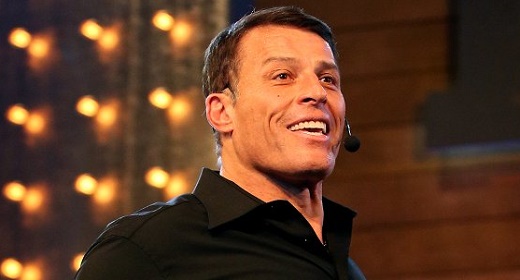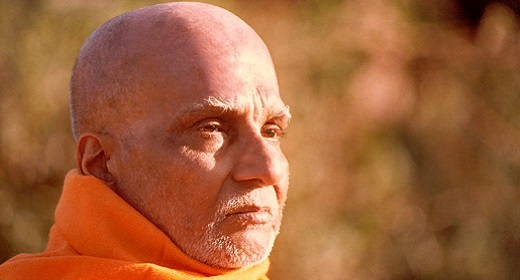by Marli Guzzetta: At the Inc. 5000 conference in San Antonio, the entrepreneur and coach gave a master class…

Around networking tables and coffee urns before the Tony Robbins session at the Inc. 5000 conference in San Antonio, attendees shared an open curiosity about the country’s preeminent life coach–the man who incites audience members to walk on hot coals. The man who brought a woman onstage and emboldened her to break up with her boyfriend over the phone in front of hundreds of people. The man who inspired Marc Benioff to start Salesforce and then to jump off a bridge.
“Did you watch his documentary on Netflix?” an attendee asked me beforehand. “I thought it was going to be evangelical, but he swears like anybody else …”
But Robbins isn’t really like anybody else. He’s big. He’s direct. He comes at you with signature energy and in very plain English.
“How many of you got into business to fulfill an emotional need? How many of you got into business to have more free time?” he asked the room of several hundred barely caffeinated business leaders, some of whom raised their hands. “Yeah, how’s that shit working for ya?”
That plain English engendered a sense of trust and camaraderie that was buoyed by touches of neurolinguistic programming and yoga and even a Louis CKism. By the end of the session, he had those professionals in business clothes dancing like kids at a Coachella DJ set.
Here are a few of the most compelling takeaways:
1. Find your own fulfillment outside of your business.
“Most of you are making your businesses based on what fulfills you, not on what fulfills your client,” explained the man who has a piece in 31 companies netting more than $5 billion. “What more of us do in businesses making under $50 million is we think of what we need and want in life, and shape the product after that. But you need to fall in love with your ideal client, not your ideal product or service. Beyond your business, find what fulfills you. Then, create your business to fulfill your client.”
2. Lead by example (and that example should be high energy).
In business or in life, you can’t do much without energy, Robbins said. You can have two people who love each other very much, but if they’re in bad moods all the time because they’re not getting enough sleep, the kids are making trouble, the house is a mess, the bills need to be paid, then the relationship is going to be low energy and it’s going to suffer, Robbins explained. To make something last, you need passion, and passion requires energy.
3. Get your energy up by doing.
Robbins explained that you get your energy up by getting out of your head and doing things, especially things that scare you. Studies have shown that people retain more and are more emotionally engaged when they’re physically engaged: or as Robbins put it, “motion creates emotion.”
Before the audience had even laughed, before it had danced or yelled, Robbins was an example of the energy he wanted to see–passing up and down the aisles with big gestures, good projection, and lots of clapping. When the energy felt low in the room, when people weren’t responsive, Robbins got people on their feet to do things. He gave them the freedom to show aggression (by yelling “I own you!” to a nearby stranger), to show affection (by massaging someone in their proximity), and even to be foolish (by dancing in intentionally silly ways with those around them). The more people acted, the more the momentum in the room picked up.
4. Impress people with what they’re really thinking.
At one point, Robbins asked for two purses from two different women in the room: One had a $2,000 Louis Vuitton Neverfull bag and the other had a $30 purse from a store by her home. Robbins asked the Louis Vuitton owner if she would have bought the other woman’s purse: “Maybe,” the LV owner said. “No, you wouldn’t,” Robbins responded, and got her to admit to an audience of her peers that she bought the Louis Vuitton bag for what it says about her level of success.
He repeated the same survey for the men in the room, this time with cars, homing in on one attendee who volunteered that he owned a Ferrari (but would never drive a Tesla).
“Why do you have a Ferrari?” Robbins asked the man.
“Because it’s badass,” he replied.
“Why wouldn’t you buy a Tesla?”
“Because I’m a man.”
Robbins then asked for the hands of audience members who owned Teslas.
“Let’s introduce you to someone who has a Tesla,” Robbins said to the Ferrari owner, and then walked to the side of the room to find Inc. 5000 speaker and Gravity Payments CEO Dan Price.
“Why did you want a Tesla?” Robbins asked Price, who made big news when he established a base salary of $70,000 for every person at his company.
Price answered earnestly: “Because I’ve always wanted one. Also, I’m into practicality.”
5. Once you’ve impressed people and earned their trust, you can ask them to do things they wouldn’t normally do, which engenders more trust.
The exchanges Robbins facilitated between the two purse owners and the Ferrari driver and Price created a shift in the audience–people were entertained and impressed, in part because he got people to say things that go unsaid. It was just after this that Robbins was able to sort a room of professionals into groups of three and get them to massage one another through their clothes. (Maybe it helped that the music was loud and the lights were dim.)
6. Choose to be happy, no matter what.
The most important decision you make–before whom you love and choose to spend time with–is to be “in a beautiful state” everyday. Robbins explained that a beautiful state is different for everyone, but it’s essentially a state in which you are happy, playful, bold, and creative, and it’s a decision. “Billionaires are becoming a dime a dozen. What’s harder to find is people who are happy.” Robbins said. “Your two-million-year-old brain is not designed to make you happy. It’s designed to make you survive, which means it’s always looking for what’s wrong.” To be happy, you have to learn what’s right, Robbins said. To be happy, you have to “know your favorite flavor of suffering”–fear, anxiety, depression, denial–then free yourself from it.
Robbins added that it’s easy to be happy when everything is going correctly, but the bigger you get, the more people you employ, the more things you do, the less likely everything is going to go well all the time. “I have 1,200 employees,” Robbins said. “What are the chances someone is effing something up somewhere?” Probably higher than you’d like to think. So you have to learn how to be happy independent of outcome.







































